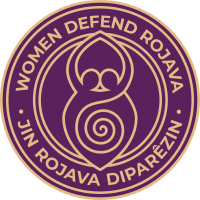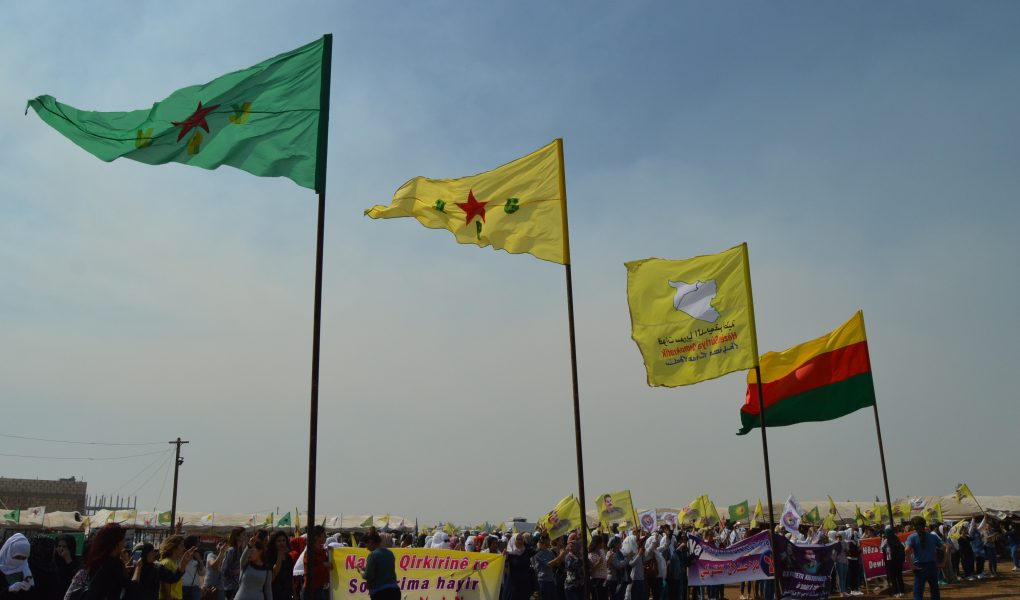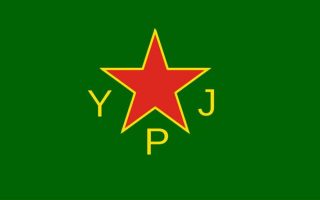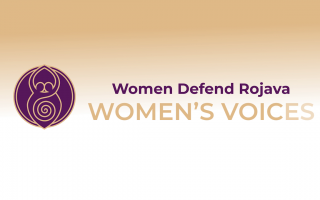Mechthild Exo is a peace and conflict researcher and anti militarist activist. Her main points of research are decolonisation of research methodology and forms of presentation, feminist and decolonialist critics of theories and concepts in global politics, grassroots democracy, self organisation and new models for peaceful systems. She is now working as a lecturer at the University of Emden. We are pleased to have her article about North and East Syria and the peace process translated into English. In it she discusses how politics is being and should be done in new ways and with women’s colours- including, perhaps especially, at the level of international diplomacy. She analyses the relationship of the armed forces and civil structures, and of the situation between the Turkish state, the Administration and the Syrian government. Original German article, and literature and sources from the article published in Wissenschaft & Frieden magazine issue 2019-3.
A peace process for Syria is possible
by Mechthild Exo
In the end of 2018 the introduction of US-troop withdrawal signaled to Turkey a free hand for a military invasion of Northern Syria. Shortly before Turkish president Recep Tayyip Erdoğan had threatened to conquer and occupy the whole region of self-administration in the North of Syria – as in March 2018 the previously most western canton of the self-administration, Efrîn, was occupied.
The announcement of withdrawal of all US-soldiers from Syria caused immediate critical reactions from the Kurdish movement, solidarity groups and from numerous foreign policy politicians, which relied on the usual thought categories of power-negotiations of armed and mostly state agents. However, the Kurdish movement had not asked the US-military to come to Syria. The achievements of the societal transformation to a grassroots-democratic, gender-liberating form of life as much and the push back and defeat of Islamic State (IS) do not have their roots in external military support, but in the political ideas of the movement. Moreover, these political ideas are essential to both the defense of the self-organized project of democracy in Northern Syria and for a peace policy for all Syria. In the following text, I elaborate on this.
Key-factor awareness
This project, which impressed so many as a lived utopia and with its courage and confidence in fighting against IS – after all, state armies had previously capitulated to the fascist murder gangs of IS1 – cannot primarily be explained by military cooperation, striking power or other factors of power. The armed actions are not understood by the Kurdish movement as the means to enforce political aims. Quite the contrary. The social and personal transformation processes, the education and the building up of structures of self-organizing are the way to implement a new society. They place these processes at the center. The armed activities of defense are complementing these and cannot be thought of as detached. Moreover, they are somewhat like the other side of the coin.
“The awareness about the achievements of the Rojava-Revolution is for the women and the population an important motivation to engage on all levels for their defense. That is, why the women of [the Kurdish women’s defense units] YPJ from Serê Kaniyê and Kobanê up to Reqqa and Dêrazor gave bravery and strength to defeat IS and put them to rout.” (Benario 2019, 20) This view is confirmed from the civil side for example by Suad Ewdilrahman in the name of the shop „beauty of women“ that is run as a cooperative by ten women: “We are satisfied with our work and want to be an example for the whole world. In the middle of our revolution, we women had been fighting at the frontlines of war. This was as important as our work here inside the society. This is also a frontline. We achieved both simultaneously. We are powerful and do not retreat in the face of our enemies. We stand as woman – against all hostilities.” (Krieg 2019)
The awareness of solidarity in the society and the will to live free and in dignity enable the resistance. They also prevent that war and experienced injustices mislead the people to brutality and destruction. In addition, this awareness is the foundation for political solutions and for the democratization of all Syria.
On 21st March 2019 the spring and New Year’s festival Newroz was celebrated in north and east Syria exceptionally exuberantly. Newroz is a festival of powerful new beginnings, of vitality, and the growth of life. For the Kurdish people, since a long time it is moreover the festival of resistance. This year they could celebrate with rejoicing and dancing that IS was successfully defeated. Since 2014, beginning at the self-administered city Kobanî, IS had been pushed back increasingly. In the weeks before Newroz 2019, IS forces had drawn back to the al-Bagouz at the border with Iraq. There the defense coalition “Syrian Democratic Forces” (SDF) encircled them. Repeatedly they postponed the last battles for the capture of al-Bagouz to prevent a massacre. Thereby, then thousands were given the chance to surrender. Two days before Newroz the last IS-posts were taken by SDF-forces, which consists of Kurdish, Arabic, Assyrian, Armenian and internationalist fighters. Many lost still during these last battles their lives, including the Italian internationalist and YPG-fighter Lorenzo Orsetti.
52.000 square kilometers in Syria were liberated from IS rule. The US military had supported with airstrikes in the frame of the anti-IS-coalition that consists of 74 states, including Germany, plus NATO and the EU. In the effort to destroy IS 11.000 fighters of all genders died: 8.5000 Kurds, 2.000 Arabs, hundreds of Assyrians and hundreds of internationalists from all over the world. 22.000 fighters have been injured. (Tev-Dem 21.3.2019)
This was for SDF and their supporters not merely a fight to defend a single region, but a fight to defend humankind, as well as for the “defense of woman in the frame of the principles of a Democratic Nation” (ANF 28.3.2019).
New political concepts: Democratic Nation and Democratic Autonomy
Since 2012 North Syria is a Democratic Nation and the foundations for it are being laid in the areas in East Syria that were liberated from IS. “Democratic Nation” is a concept which understands nation fundamentally differently from the common concept of nation, which is related to the state as ordering structure and has a territorial border. Nation here has nothing to do with nation statehood nor nationalism, and it is not limited to one ethnic identity. The Democratic Nation is a connection of various cultural, ethnic, and social groups and of free individuals based on free will. The social groups do not need to be homogenous or to demonstrate a common history, but rather embrace different ethnic, cultural, religious and other identities.
In the self-administration of North and East Syria, beside Kurds there are also living Arabs, Assyrians, Turkmen, Ezidi and other groups. In the last years, plenty of war refugees from other parts of Syria and more Ezidi people after the IS massacre in Shengal/Iraq came to North Syria. Connected with this pluralist understanding of a nation that is bound together by free will and solidarity is the responsibility for political decision making and for the organizing of life, which is taken over by the society itself. This system of democratic self-organizing guarantees to the various social groups, e.g. religious minorities and the youth, their own autonomous structures and rights. Therefore, it is called “Democratic Autonomy”. These structures are represented to the outside by the executive council and by the recently founded women’s council of the Federation of North and East Syria. The Kurdish dominated Democratic Union Party (PYD) also represents this project with their work in North and East Syria plus on the international level.
Where before state rule ignored the society and the mindset of power politics and market economy dominated, now societal life, social relations, and communal spaces for communication and decision making are placed at the centre.
Women’s organizing as foundation for the liberation of society
The organizing of women and overcoming the patriarchal foundations of family and all other social structures are considered as necessary conditions for the liberation of society.
After the city of Raqqa was liberated from IS-rule in October 2017, women’s communes and women’s councils were convened as the very first step to build up Democratic Autonomy – as everywhere in the self-administered region. Women have additional autonomous structures, for example as “young women” or in the form of an economic women’s cooperative, a women’s academy or women’s consulting institutions. Furthermore there is the principle of equal representation of women and men in the overarching bodies for decision making (in principle 50:50). All leadership positions are executed by a co-leadership of one man and one woman. The executive council as well as the women’s council of the Democratic Federation of North and East Syria make up the overall representation. “Jineolojî” (science of women; “jin” is the Kurdish term for “woman”) lays the ground for a new form of social sciences. Jineolojî radically questions the positivist, Eurocentric and from its roots patriarchal (western) academic system and sets other criteria and methods for developing knowledge and praxis.
Theory of the democratic solution
After the expulsion of IS, the question of securing the building-up of democracy is most of all tied to the destructive role of the Turkish state. The importance of peace negotiations have become evident with the Turkish threat of attack in the end of 2018. The announced withdrawal of US-troops had been criticized from many sides, finally it was not implemented and in the following months, it was adjusted. In addition, many sides, including the USA, declared and demanded the protection of the Kurds in North Syria against attacks by Turkey.
In contrary to the usual diplomatic reactions that rely on claims of power and on state-centric thinking, a differing peace strategy becomes visible within the local social processes. This peace strategy is based on a solution of the problems of the societies, on a democratic solution. Therefore, peace must come from within society and fulfil the will of the people.
This approach becomes obvious when despite the danger of military attack the implementation of grassroots democracy is deepened and widened. Additional communes are founded, more kindergartens, women’s cooperatives and jineolojî-centers are established. At the opening of the jineoloji research center at Hesekê, 8th January 2019, it was announced that this is “the best answer to all threats of attack” (ANF 8.1.2019).
The longtime chairperson of PKK Abdullah Öcalan, who is imprisoned in Turkey since 1999, is also for many Kurds in Syria considered as their representative. The societal model in the self-administered region is based on his political philosophy and currently his elaborations of a theory for a democratic solution and of a roadmap for peace (Öcalan 2009, in German 2013) receive much attention.
Öcalan speaks out on the developments in Syria as follows: “[W]ithin the scope of Syrian Democratic Forces (SDF), the culture of conflict should be avoided in relation to the problems in Syria; they should aim to convey their own position and situation to a solution based on a local democracy perspective that has constitutional guarantee within the framework of Syria’s unity. (Öcalan et al. 2019, p. 6). Öcalan considers it “necessary to be prepared for a constitutional democratic solution and to develop ways that can also convince the Syrian regime. From his point of view it is important, that when in Northern Syria as part of the entity of Syria methods such as autonomy, federation and similar are developed, in doing so to apply a political way of thinking which encompasses the whole of Syria.” (ANF 21.6.2019)
To realize these ideas of a democratic peace solution, peace-negotiations must be socially incorporated in an all-encompassing communication process and follow the will of the society – instead of being fixed without integrating the population. This peace process must involve PYD, the executive council as well as the women’s council of the federation of North and East Syria and secure the democratic, gender liberating and ecological developments in Rojava. The participation of the organized women is essential in this.
Peace and Democractic Conferderalism in Syria
Parallel with SDF the civil political umbrella alliance “Democratic Council of Syria” (SDC) was founded in the end of 2015. Both stand up for a secular, democratic and federally structured Syria. İlham Ahmed, co-chairwoman of the Syrian Democratic Council declared: “The whole Syrian people has problems regarding freedom and rights. There exist not only problems of the Kurdish women and men, of one nation or one single area. The Syrian people are unhappy with a whole slew of issues. We want to democratize Damaskus. We want to democratize entire Syria.” (Duran/Başlangıç 25.8.2018) At a meeting with the government of Syria in the summer of 2018, SDC suggested the model of Democratic Autonomy as solution for the whole of Syria – without success.
The SDC is a structure composed of various organizations, which intend to build-up the unity of the Syrian opposition via dialogue. For this purpose, an all-Syrian National Congress is being prepared. A draft of a new Syrian constitution envisages the unity and wholeness of Syria as much as a political system that enables the creation of a decentralized and democratic Syria. In accordance with resolution 2254 of the UN Security Council, they demand a political solution and a ceasefire, the end of the occupation and the withdrawal of foreign military forces from the Syrian territory (ANF 29.3.2019).
The acknowledgement of the self-administration of Northern and Eastern Syria is a crucial precondition for a peace solution for Syria. A throwback to the condition before 2011 is out of question for the people in the region of self-administration. Moreover, they insist that Efrîn must be given back to its former, but displaced, population, which is majority Kurdish.
In June 2019, the North-East-Syrian Tev-Dem (Movement for a Democratic Society) argued for the revival of the Geneva peace talks under the leadership of the United Nations and with the participation of the representatives of the self-administration of Northern and Eastern Syria. In addition, they demanded the implementation of an international tribunal for the judicial proceedings against the IS-members (Azadi/Güler 13.6.2019).
The four leading German peace research institutes made in their joint “Peace Survey 2018” (“Friedensgutachten 2018”) the recommendations to the German government to publicly and in its diplomatic power urge for a withdrawal of Turkish troops from Syria and from Iraq. Aside from that the German government should “intercede insistently for a political solution of the questions concerning the Kurdish demands for self-determination. To this end it should insist on the inclusion of PYD [as the strongest political representation of the Kurdish population, author’s note] in the negotiations on the future of Syria.” Germany should stop arms exports into the region and take a more pro-active role for the peace process. (Bonn International Center for Conversion et al. 2018, p. 38)
Several government representatives visited the Democratic Federation Northern and Eastern Syria in the last months, e.g. from Norway, Sweden, France and Australia, and thereby enhanced the Federation. Germany continues to avoid establishing contacts with the Democratic Federation and tries to get around the repatriation of German IS-fighters and their family members.2 At least the German government participates in international meetings that examine the establishment of an international criminal tribunal for the conviction of IS-perpetrators who are detained among others in the Federation Northern and Eastern Syria. Relations of cooperation with facilities of the self-organized society in Northern Syria have been cultivated on the level of civil society already for several years, beside others in the health sector, as university cooperation, and as partnership relations between schools, between cities, between bookshops, and between kindergartens.
1 Unpleasantly, even parts of the peace movement had already accepted the power of IS and asked for negotiations towards a political participation in the power structures – which is as wrong and dangerous as the similar demand for a participation of Taliban in Afghanistan via peace talks.
2 Finally, 19. August 2019 the German consulate for the first time received four IS-children from the Democratic Federation Northern and Eastern Syria at Sêmalka border office, because it had to follow a respective German court decision.




